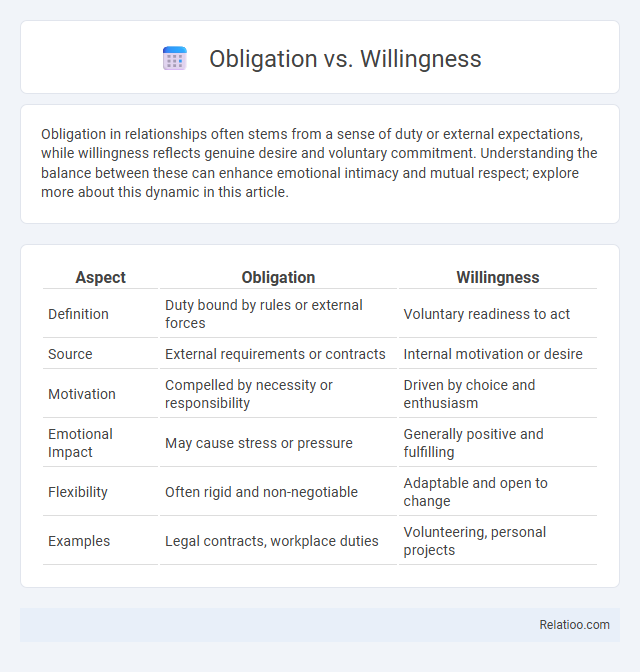Obligation in relationships often stems from a sense of duty or external expectations, while willingness reflects genuine desire and voluntary commitment. Understanding the balance between these can enhance emotional intimacy and mutual respect; explore more about this dynamic in this article.
Table of Comparison
| Aspect | Obligation | Willingness |
|---|---|---|
| Definition | Duty bound by rules or external forces | Voluntary readiness to act |
| Source | External requirements or contracts | Internal motivation or desire |
| Motivation | Compelled by necessity or responsibility | Driven by choice and enthusiasm |
| Emotional Impact | May cause stress or pressure | Generally positive and fulfilling |
| Flexibility | Often rigid and non-negotiable | Adaptable and open to change |
| Examples | Legal contracts, workplace duties | Volunteering, personal projects |
Understanding Obligation: Definition and Context
Obligation refers to a duty or commitment that compels you to act in a specific way based on legal, moral, or social rules, often carrying a sense of responsibility or necessity. Understanding obligation involves recognizing its binding nature, which distinguishes it from willingness, where actions are driven by personal desire or voluntary choice rather than external pressures. In various contexts, obligations can be formalized through contracts, laws, or societal expectations, shaping behavior irrespective of individual willingness.
Defining Willingness: Meaning and Significance
Willingness refers to the genuine readiness or desire to engage in an action or decision, reflecting intrinsic motivation rather than external pressure. Your willingness plays a crucial role in determining the effectiveness and authenticity of your commitments, as it aligns personal values with actions. This concept is significant because it differentiates voluntary participation from mere obligation, enhancing overall engagement and satisfaction in any task or relationship.
Key Differences Between Obligation and Willingness
Obligation refers to a duty or commitment imposed by external rules or moral principles, whereas willingness is a voluntary and internal desire to perform a task or action. The key difference lies in motivation: obligation stems from necessity or responsibility, while willingness arises from personal choice and enthusiasm. Understanding this distinction clarifies how individuals approach tasks, either feeling compelled or eager to engage.
The Role of Social and Cultural Influences
Obligation, willingness, and voluntary action are shaped significantly by social and cultural influences, which dictate acceptable behaviors and societal expectations. You navigate these forces daily as cultural norms create implicit obligations, while social approval motivates genuine willingness. Understanding this dynamic helps distinguish between actions driven by external pressure and those arising from inner motivation.
Motivation: What Drives Obligation vs Willingness
Obligation is driven by external pressures such as rules, duties, or societal expectations that compel You to act even without personal desire. Willingness stems from internal motivation, where Your actions align with personal values and intrinsic satisfaction. The key difference lies in motivation: obligation relies on external demands, while willingness emerges from authentic personal choice and enthusiasm.
Psychological Impact of Acting out of Obligation
Acting out of obligation often triggers feelings of stress, resentment, and decreased motivation, as individuals may perceive their actions as imposed rather than chosen, undermining intrinsic motivation and leading to burnout. In contrast, willingness is linked to autonomy and positive psychological outcomes such as increased engagement, satisfaction, and emotional well-being since actions align with personal values and desires. Understanding the psychological impact of obligation highlights the importance of fostering willingness to enhance mental health and sustainable motivation.
Benefits of Acting Willingly
Acting willingly enhances your motivation and engagement, leading to higher productivity and better outcomes. When you embrace tasks with genuine willingness, stress decreases and creativity flourishes, fostering a positive mindset. This proactive attitude strengthens relationships and builds trust, creating lasting personal and professional benefits.
Real-life Examples: Obligation vs Willingness in Action
Your daily decisions often reflect the tension between obligation and willingness, seen clearly when you choose to complete work tasks versus engaging in hobbies. For example, fulfilling a deadline at your job represents obligation driven by responsibility and external expectations, whereas spending time painting illustrates willingness motivated by personal passion. Understanding this dynamic can improve how you balance duties with desires, leading to more fulfilling experiences and reduced stress.
Navigating Conflicts Between Duty and Desire
Navigating conflicts between obligation, willingness, and desire requires balancing external responsibilities with internal motivations. Obligation often drives actions based on duty or moral imperatives, while willingness reflects a voluntary readiness to act, influenced by personal values and emotions. Understanding the interplay between these concepts is crucial for resolving tensions where duty may conflict with personal desires or intrinsic motivation.
Enhancing Willingness in Obligatory Situations
Enhancing willingness in obligatory situations requires reframing tasks to highlight personal value and intrinsic motivation, which increases engagement despite the necessity of the obligation. Studies in behavioral psychology show that autonomy-supportive environments foster internal motivation, reducing resistance and improving compliance with mandatory requirements. Techniques such as offering meaningful choices and connecting obligations to individual goals effectively transform perceived duty into willing participation.

Infographic: Obligation vs Willingness
 relatioo.com
relatioo.com